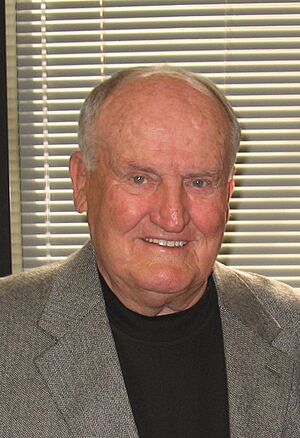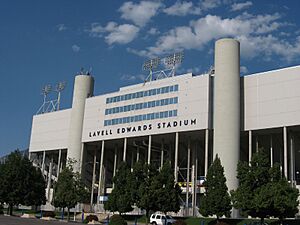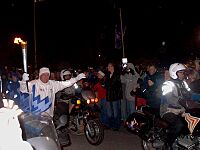LaVell Edwards facts for kids

Edwards in 2010
|
|
| Biographical details | |
|---|---|
| Born | October 11, 1930 Orem, Utah, U.S. |
| Died | December 29, 2016 (aged 86) Provo, Utah, U.S. |
| Alma mater | Utah State University (B.A.) University of Utah (M.Ed.) Brigham Young University (Ed.D.) |
| Playing career | |
| 1949–1951 | Utah State |
| Position(s) | Offensive lineman |
| Coaching career (HC unless noted) | |
| 1954–1961 | Granite HS (UT) |
| 1962–1971 | BYU (assistant) |
| 1972–2000 | BYU |
| Head coaching record | |
| Overall | 257–101–3 (college) |
| Bowls | 7–14–1 |
| Accomplishments and honors | |
| Championships | |
| 1 national (1984) 18 WAC (1974, 1976–1985, 1989–1993, 1995–1996) 1 MWC (1999) |
|
| Awards | |
| Bobby Dodd Coach of the Year Award (1979) AFCA Coach of the Year (1984) Eddie Robinson Coach of the Year (1984) Amos Alonzo Stagg Award (2003) |
|
| College Football Hall of Fame Inducted in 2004 (profile) |
|
Reuben LaVell Edwards (October 11, 1930 – December 29, 2016) was an American football head coach for Brigham Young University (BYU). With 257 career victories, he ranks as one of the most successful college football coaches of all time. Among his many notable accomplishments, Edwards guided BYU to a national championship in 1984 and coached Heisman Trophy winner Ty Detmer in 1990.
Edwards played football for Utah State University and earned a master's degree at the University of Utah prior to coaching at BYU, where he also earned his doctorate.
Contents
Coaching career
Edwards was BYU's head football coach from 1972 to 2000. He had previously served as an assistant coach from 1962 to 1971. His offensive scheme was passing-dominated. He started coaching in an era when college football offenses were dominated by strong running attacks. His quarterbacks threw over 11,000 passes for more than 100,000 yards and 635 touchdowns. He got the idea to switch to a pass oriented team by looking at BYU's history. The BYU football program had struggled before Edwards with the notable exception of one conference championship that resulted from the aerial attack of Virgil Carter. This past success encouraged Edwards to open up the BYU offense.
Edwards coached prominent quarterbacks such as Steve Young, Jim McMahon, Ty Detmer, Marc Wilson, Robbie Bosco, Gary Scheide, Gifford Nielsen and Steve Sarkisian.

Awards won by his players include a Heisman Trophy, a Doak Walker Award, a Maxwell Award, two Outland Trophies, four Davey O'Brien Awards, seven Sammy Baugh Awards, 34 All-America citations (including 10 consensus All-Americans), 11 conference player of the year and 24 Academic All-America player citations.
In 1984, he was named National Coach of the Year after BYU finished the season 13–0 and won the National Championship. Edwards retired after the 2000 season with a 257–101–3 record.
Prior to Edwards' final game, BYU renamed its home field, Cougar Stadium, as LaVell Edwards Stadium in his honor. The stadium had almost doubled in his capacity during his tenure, from 35,000 people when he took over the program to over 65,000 people upon his retirement.
At the time of his retirement, he ranked sixth all-time in victories, and second all-time in victories with a single program (behind only Joe Paterno at Penn State). Edwards received the Amos Alonzo Stagg Award, presented by the American Football Coaches Association, in 2003.
In the 1980 Holiday Bowl, BYU rallied from a 45–25 deficit with only 4 minutes to play to defeat Southern Methodist University (SMU).
Following the 1984 national championship, Edwards was offered head coaching positions with the Detroit Lions and the University of Texas at Austin, but he turned down both offers.
Accomplishments
- 22nd on NCAA all-time list for coaching victories (257)
- Member of the College Football Hall of Fame
- Coached 6 all-American quarterbacks
- His teams led the nation in passing offense 8 times
- His teams led the nation in total offense 5 times
- His teams led the nation in scoring offense 3 times
Coaching tree
- Dick Felt, former BYU assistant athletic director / assistant head coach / defensive coordinator / defensive backfield coach (BYU defensive back / running back / punter)
- Mike Holmgren, former Seattle Seahawks & Green Bay Packers head coach, Cleveland Browns president of operations (BYU quarterbacks coach)
- Steve Sarkisian, University of Texas head coach & former University of Southern California head coach (BYU quarterback)
- Norm Chow, former Hawaii head coach, USC offensive coordinator, UCLA offensive coordinator, Tennessee Titans offensive coordinator (BYU offensive coordinator)
- Dave Kragthorpe, former Oregon State head coach, father of Steve Kragthorpe (BYU offensive line coach)
- Kyle Whittingham, Utah head coach (BYU linebacker)
- Fred Whittingham, longtime NFL and college assistant coach (BYU defensive coordinator)
- Robert Anae, NC State offensive coordinator (BYU offensive lineman)
- Brian Billick, former NFL head coach (BYU tight end / graduate assistant)
- Ted Tollner, former USC head coach (BYU offensive coordinator)
- Doug Scovil, former SDSU head coach (BYU offensive coordinator)
- Brandon Doman, former BYU offensive coordinator (BYU quarterback)
- Tom Holmoe, BYU athletic director & former Cal head coach (BYU defensive back)
- Andy Reid, Kansas City Chiefs head coach (BYU lineman / graduate assistant)
- Charlie Stubbs, Louisville offensive coordinator (BYU graduate assistant)
- Kalani Sitake, BYU head coach, (BYU running back, graduate assistant)
- Ty Detmer, former BYU offensive coordinator, (BYU quarterback / Heisman Trophy winner)
- Gary Crowton, former Louisiana Tech and BYU head coach, Chicago Bears offensive coordinator, Maryland offensive coordinator, LSU offensive coordinator, Oregon offensive coordinator (BYU Graduate Assistant)
Head coaching record
| Year | Team | Overall | Conference | Standing | Bowl/playoffs | Coaches# | AP° | ||
|---|---|---|---|---|---|---|---|---|---|
| BYU Cougars (Western Athletic Conference) (1972–1998) | |||||||||
| 1972 | BYU | 7–4 | 5–2 | T–2nd | |||||
| 1973 | BYU | 5–6 | 3–4 | T–4th | |||||
| 1974 | BYU | 7–4–1 | 6–0–1 | 1st | L Fiesta | ||||
| 1975 | BYU | 6–5 | 4–3 | T–4th | |||||
| 1976 | BYU | 9–3 | 6–1 | T–1st | L Tangerine | ||||
| 1977 | BYU | 9–2 | 6–1 | T–1st | 16 | 20 | |||
| 1978 | BYU | 9–4 | 5–1 | 1st | L Holiday | ||||
| 1979 | BYU | 11–1 | 7–0 | 1st | L Holiday | 12 | 13 | ||
| 1980 | BYU | 12–1 | 6–1 | 1st | W Holiday | 11 | 12 | ||
| 1981 | BYU | 11–2 | 7–1 | 1st | W Holiday | 11 | 13 | ||
| 1982 | BYU | 8–4 | 7–1 | 1st | L Holiday | ||||
| 1983 | BYU | 11–1 | 7–0 | 1st | W Holiday | 7 | 7 | ||
| 1984 | BYU | 13–0 | 8–0 | 1st | W Holiday | 1 | 1 | ||
| 1985 | BYU | 11–3 | 7–1 | 1st | L Florida Citrus | 17 | 16 | ||
| 1986 | BYU | 8–5 | 6–2 | 2nd | L Freedom | ||||
| 1987 | BYU | 9–4 | 7–1 | 2nd | L All-American | ||||
| 1988 | BYU | 9–4 | 5–3 | T–3rd | W Freedom | ||||
| 1989 | BYU | 10–3 | 7–1 | 1st | L Holiday | 18 | 22 | ||
| 1990 | BYU | 10–3 | 7–1 | 1st | L Holiday | T–17 | 22 | ||
| 1991 | BYU | 8–3–2 | 7–0–1 | 1st | T Holiday | 23 | 23 | ||
| 1992 | BYU | 8–5 | 6–2 | T–1st | L Aloha | ||||
| 1993 | BYU | 6–6 | 6–2 | T–1st | L Holiday | ||||
| 1994 | BYU | 10–3 | 6–2 | T–2nd | W Copper | 10 | 18 | ||
| 1995 | BYU | 7–4 | 6–2 | T–1st | |||||
| 1996 | BYU | 14–1 | 8–0 | 1st (Mountain) | W Cotton | 5 | 5 | ||
| 1997 | BYU | 6–5 | 4–4 | 5th (Mountain) | |||||
| 1998 | BYU | 9–5 | 7–1 | T–1st (Pacific) | L Liberty | ||||
| BYU Cougars (Mountain West Conference) (1999–2000) | |||||||||
| 1999 | BYU | 8–4 | 5–2 | T–1st | L Motor City | ||||
| 2000 | BYU | 6–6 | 4–3 | T–3rd | |||||
| BYU: | 257–101–3 | 175–42–2 | |||||||
| Total: | 257–101–3 | ||||||||
| National championship Conference title Conference division title or championship game berth | |||||||||
|
|||||||||
Personal life
While head football coach at BYU, Edwards also earned a doctorate.
Following his retirement from coaching, Edwards remained a prominent leader and speaker for members of the Church of Jesus Christ of Latter-day Saints (LDS Church), which owns and operates BYU. He and his wife served an 18-month mission for the LDS Church in New York City during 2002 and 2003.
Death
Edwards suffered a broken hip on December 24, 2016, and died five days later at his home in Provo on December 29, at the age of 86. A public memorial service was held at the Utah Valley Convention Center in Provo on January 6, 2017. A private funeral service for family and friends was then held the next day, on January 7.
See also
- Legends Poll
- List of presidents of the American Football Coaches Association
- List of college football coaches with 200 wins


